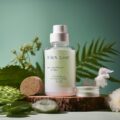Introduction: Nourishing Your Skin with the Perfect Face Mask
Your skin is as unique as you are, and it deserves special care tailored to its specific needs. Face masks are a wonderful way to show your skin some extra love and address various concerns, from dryness to breakouts. In this compassionate guide, we’ll explore the best face masks for different skin types and concerns, helping you create a self-care ritual that leaves you feeling refreshed, confident, and radiant.
Understanding Your Skin Type
Before diving into the world of face masks, it’s essential to understand your skin type. This knowledge will help you choose products that work in harmony with your skin, rather than against it. Here are the main skin types:
- Normal: Well-balanced, not too oily or dry
- Dry: Feels tight, may have flaky patches
- Oily: Shiny, prone to breakouts
- Combination: Oily in some areas (usually T-zone) and dry in others
- Sensitive: Easily irritated, may react to certain ingredients
Remember, your skin type can change over time due to factors like age, hormones, and environment. Listen to your skin and adjust your skincare routine accordingly.
Hydrating Masks for Dry and Dehydrated Skin
If your skin feels parched and tight, hydrating masks can be a game-changer. Look for ingredients like hyaluronic acid, glycerin, and aloe vera, which attract and retain moisture in the skin.
Some excellent options include:
- Overnight hydrating masks with ceramides and fatty acids
- Sheet masks infused with hyaluronic acid and botanical extracts
- Gel-based masks with aloe vera and cucumber
These masks not only provide immediate relief but also help strengthen your skin’s moisture barrier, promoting long-term hydration and a healthy glow.
Balancing and Purifying Masks for Oily and Acne-Prone Skin
For those battling excess oil and breakouts, the right face mask can work wonders in balancing sebum production and clearing pores. Look for ingredients like:
- Clay (kaolin or bentonite) to absorb excess oil
- Salicylic acid to exfoliate and unclog pores
- Tea tree oil for its antibacterial properties
- Niacinamide to regulate oil production and reduce inflammation
Remember to be gentle with your skin. Over-drying can actually lead to increased oil production, so balance is key. Use these masks 1-2 times a week and follow up with a lightweight, non-comedogenic moisturizer.
Soothing and Calming Masks for Sensitive Skin
If your skin is easily irritated, it’s crucial to choose gentle, fragrance-free masks that calm and soothe. Look for ingredients known for their anti-inflammatory properties:
- Colloidal oatmeal to relieve itching and redness
- Chamomile to soothe and reduce inflammation
- Aloe vera for its cooling and healing properties
- Centella asiatica (also known as cica) to strengthen the skin barrier
Always patch test new products and introduce them slowly into your routine. Remember, less is often more when it comes to sensitive skin.
Anti-Aging Masks for Mature Skin
As we age, our skin’s needs change. Anti-aging masks can help address concerns like fine lines, loss of firmness, and uneven skin tone. Look for masks rich in:
- Retinol or bakuchiol for cell turnover and collagen production
- Vitamin C for brightening and antioxidant protection
- Peptides to support skin structure and elasticity
- Hyaluronic acid for plumping and hydration
Remember, aging is a natural process, and these masks are about nourishing your skin and embracing your journey with grace and self-love.
DIY Face Masks: Nature’s Bounty for Your Skin
Sometimes, the best face masks can be made right in your kitchen. Natural ingredients can be incredibly effective and gentle on the skin. Here are some simple DIY mask ideas:
- For dry skin: Mash half an avocado with a tablespoon of honey
- For oily skin: Mix 1 tablespoon of yogurt with a few drops of lemon juice
- For sensitive skin: Blend cooked oatmeal with a bit of warm water until smooth
- For brightening: Mix 1 tablespoon of turmeric powder with 2 tablespoons of honey
Always do a patch test before applying any new mixture to your face, and enjoy the process of creating something nurturing for your skin.
FAQ: Your Face Mask Questions Answered
1. How often should I use a face mask?
It depends on your skin type and the mask’s ingredients. Generally, 1-3 times a week is sufficient. For gentler masks, you might use them more frequently, while stronger treatments should be used less often.
2. Should I wash my face before or after using a mask?
Always cleanse your face before applying a mask to ensure it can penetrate effectively. After removing the mask, follow the product instructions – some require rinsing, while others can be massaged into the skin.
3. Can I use multiple masks in one week?
Yes, you can use different masks to target various skin concerns. Just be careful not to over-treat your skin. Listen to your skin’s needs and adjust accordingly.
4. Are sheet masks better than traditional masks?
Neither is inherently better; they serve different purposes. Sheet masks are great for hydration and convenience, while traditional masks often provide deeper treatments for specific concerns.
5. Can face masks replace my regular skincare routine?
Face masks are a wonderful addition to your skincare routine, but they shouldn’t replace daily cleansing, moisturizing, and sun protection. Think of masks as a special treatment to complement your regular routine.
Conclusion: Embracing Self-Care Through Skincare
Choosing the right face mask is more than just addressing skin concerns – it’s an act of self-love and care. As you explore different masks and find what works best for your unique skin, remember that true beauty comes from within. Let your skincare routine be a moment of mindfulness, a time to appreciate yourself and nurture your well-being.
Whether you’re indulging in a luxurious store-bought mask or whipping up a natural concoction in your kitchen, the most important ingredient is the love and care you’re showing yourself. Here’s to healthy, happy skin and the beautiful soul it reflects!









